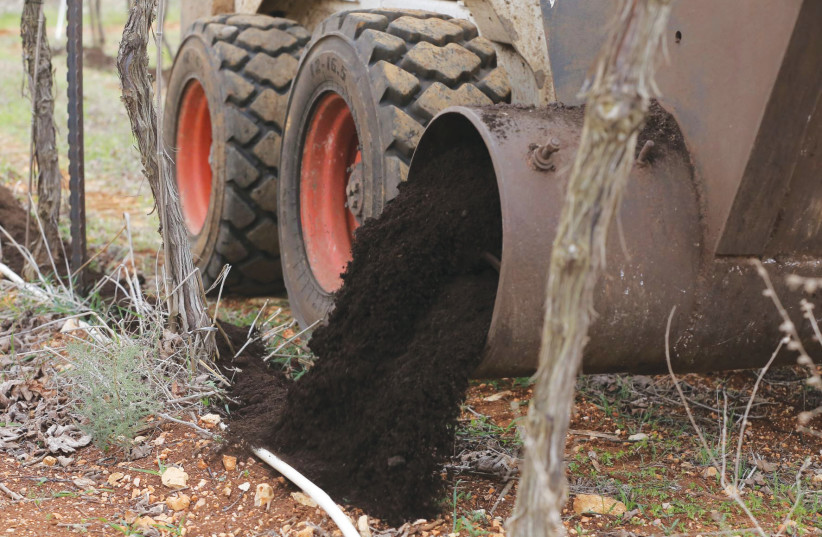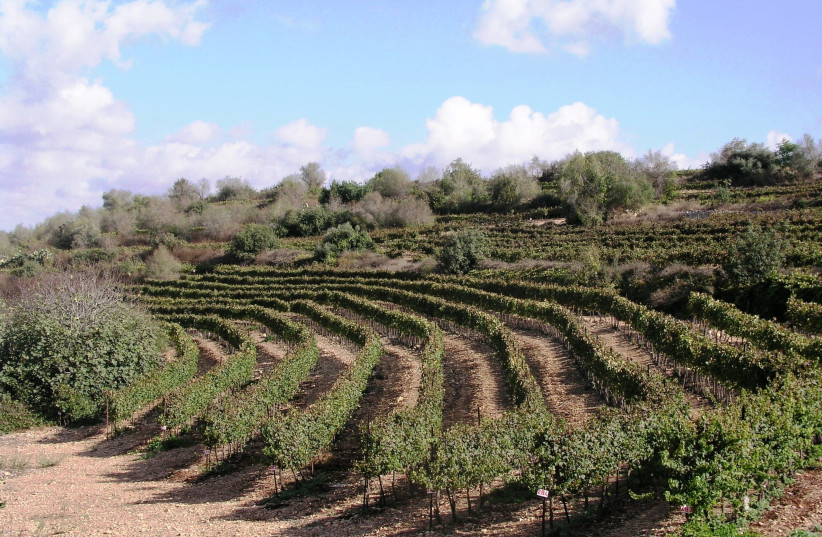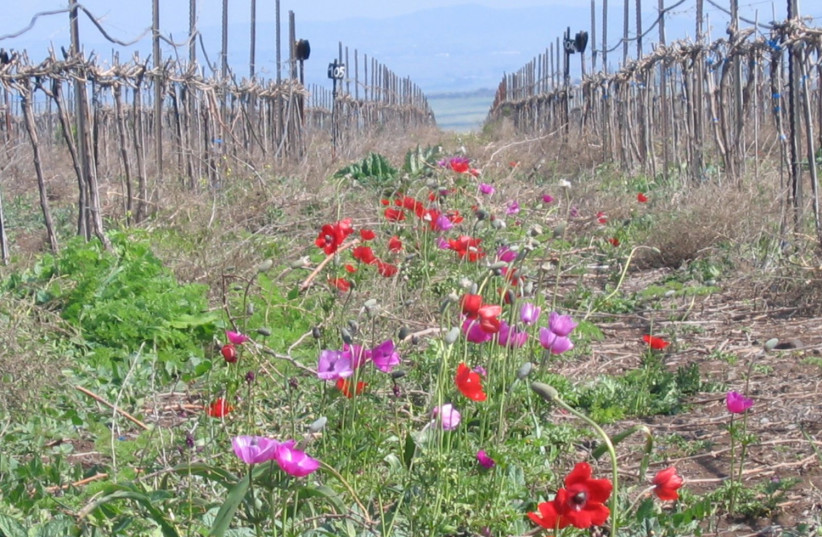A few years ago, the wine team of one of the world’s most famous wineries in France visited Israel. The team members spent a week here, visiting wineries, vineyards, universities and other academic institutions.
When I asked the owner why a winery from Bordeaux, of all places, would go to Israel to learn, and not, say, to Australia, I was told: “Israel is streets ahead. No one has the research and development that is taking place here.”
“Israel is streets ahead. No one has the research and development that is taking place here.”
Bordeaux wine team
Unfortunately, when I posted a proud photo with the winery owner, I was told to take it down. It was a secret visit – though it was in no way secret to all the wine people and researchers they met.
Using AI to help wineries
I thought about this when I heard that Ilai Englard was a guest at the Act for Change Symposium in Bordeaux. He took this opportunity to explain how his company, Trellis, could help wineries. Trellis uses AI (artificial intelligence) to improve efficiency and sustainability, helping wineries in their decision-making in terms of growing, harvesting, winemaking and marketing.

Now, we all know of the Israeli excellence and innovation in agriculture. Just look at who invented drip feed irrigation, which is now used worldwide. Netafim is now a mega, global company. However, Israel is still one of the tiniest wine-producing countries, and though we are exceedingly proud and talk a good game, in the main, if we are being honest, the wine world gets along very well without us.
The wine trade is notorious for being extremely conservative and slow to change. For example, wine is still sold in heavy glass bottles, with a bit of tree bark used as a stopper. No change there... for the last 300 years, anyway. Well, here was this Israeli company, boldly going into the lion’s den, to illustrate to the Bordelais a different way forward. The event was held at the Cité du Vin (incidentally, a must-visit wine museum) in Bordeaux. Englard explained to the staid wine trade that he has the answers to improve its business.
The proof of the pudding is in the eating. Trellis is already working with Gallo, the largest winery in the world. Just to put this in perspective, Gallo’s so-called boutique winery, once called Gallo of Sonoma, makes more wine annually than all of Israel put together.
It seems Israeli technology, innovation, creativity and intelligence (in both meanings of the word), mixed with a little Israeli chutzpah, make a potent cocktail.
SO, OF course, I had to meet Englard. We met at a café in Ra’anana, close to my home patch.
He came in looking around, shiny-eyed, and told me that this exact street was the place of his youth, where he grew up and hung around with his friends. His family came to Ra’anana because in those days it was still slightly rural, and education was good. These two parameters were important to his parents.
However, we are jumping ahead of ourselves. His grandparents on his father’s side came from Germany in 1934. They were religious Zionists. A first wine memory for Ilay was tasting the grapes and homemade Kiddush wine made by his grandfather in his back yard. His mother’s parents came from Iraq.
Ilay was a sickly child who suffered from breathing difficulties and asthma. His mother always thought it was because of the crop spraying in the fields nearby. This must have seeped into the consciousness of the young boy. He was later to become a warrior in the battle to conserve the environment, farm sustainably, promote biodiversity, and advance regenerative agriculture.
He looks healthy enough today. He is tall, good-looking, with dark hair and a carefully manicured beard, with the merest flecks of gray. He has a ready, disarming smile, and is warm, quite clearly incredibly bright, but modest, not at all geekish, and is willing to indulge in small talk.
Of course, he is Israeli... and this actually helped him gain credibility when he turned up on the doorsteps of the global giants, asking for a meeting. He was well received. As he said: “Big companies are eager to learn, and innovation sells.” Global giants Pernod Ricard and Treasury Wine Estates joined Gallo in tapping into Trellis’s expertise.
Englard studied computer science and philosophy at Tel Aviv University. He then became an integral part of the super-elite Unit 8200 in the IDF Intelligence Corps. He was highly motivated, part of the crème de la crème, and his outstanding work received awards and recognition, and set him apart. He felt empowered, was certain he could contribute and create change.

Englard was also part of a group of similarly motivated young people exploring social and environmental sustainability. It started as a hobby and became an all-consuming passion. He read all he could on plant science and horticulture. He explained to me: “Our entire existence depends on plants.” This led him to think deeply of food security issues, and he even had personal, practical experience on an urban farm in London.
He then worked for Microsoft for six years, which was another incubator for productive brainstorming and encouraged thinking big. He became obsessed with the idea of compiling environmental data so decisions could be on a basis of information rather than intuition. He observed that the existing system for collating knowledge and information was totally fragmented, information was too local, and even within companies, knowledge at their fingertips was not shared. All this when uncertainties, doubts and extreme climatic events were coming more to the fore.
Englard’s interest and expertise were in digital innovation in the agri-food industry. He founded his company in 2017 and called it “Trellis” because that is what supports and connects plants. He was to support and connect, to improve efficiency and sustainability. He combined his expertise in systems and information with his idealism for a better world. For him, efficiency and sustainability are two sides of the same coin.
The agri-food industry is massive and world encompassing, so from that grand entrance how did he reach a decision to focus on wine?
His ideal was the simplest possible supply chain, which is “farm to market.” If you have farm to market, you have a measure of control over all aspects of the business. Interestingly, he identified that wine already operated a kind of farm-to-market ethos. The source of the wine grapes is known, the grower and winemaker have a long-term relationship, and the work in the vineyard will often dictate the style, quality and price of td wine as the ideal vertical integrated production system and decided to apply his AI expertise to the wine sector.
He did a pilot, working with two progressive wineries – Tabor Winery, situated in Kfar Tabor in the Lower Galilee, and Yatir Winery, from Tel Arad in the northeastern Negev. He then went to America, where Oded Shakked of Longboard Vineyards (formerly of J Vineyards) became an ally and assisted from California in 2019.
In the last few years, the wine industry has been struck with a series of extreme weather disasters. This includes raging fires in Australia and California and floods in Germany. Even some Judean Hills vineyards were scorched by fires. The result of these repetitive extreme events is that suddenly everyone is talking climate change, when it was barely on the radar only 10 years ago.
Englard told me that knowledge in wine is very much localized in a place (like a vineyard) and in the hands of an individual (say, the grower or winemaker). He went on to say that even the most experienced winemaker or grape grower, who may have worked for 30 years, will at the end of the day have done only 30 harvests.

He explained to me that the management of the corona pandemic was a recent application of how sharing wider information with broader parameters can work effectively. Information was gathered from different experiences in different countries, which enabled more accurate predictions and more efficient planning in one’s own country.
We have certainly seen changes in the past decade. Just look at the vineyards. It was not so long ago that the standard vineyard had the vines standing straight like soldiers, and there was a strip of brown dirt in between the rows. The lines were formal, manicured, clean and virtually standard. Now vineyards look different. In between the rows is a cover crop, often with wild flowers in the spring. To the onlooker, the modern day vineyard looks unkempt and a little wild. This reflects the change in view over the past decade. Current objectives are to promote biodiversity, grow sustainably and put life back into the vineyards.
So these days, everyone is talking about climate change, and “sustainability” has become one of the most overused and abused words in wine. There are, though, champions of true sustainability that are leading the way.
First and foremost is the Golan Heights Winery. There, winemake Victor Schoenfeld runs an extremely impressive operation by any criteria. In vineyard technology, it must be one of the most advanced wineries in the world. The winery has been certified as sustainable according to the protocol of Lodi Rules, a set of guidelines used by winegrowers throughout the Lodi winegrowing region of California to ensure that their products are grown in a sustainable manner.
Another pioneer is Galil Mountain Winery, which successfully practices sustainability in the vineyard, at the winery and in the office. Famously, it recycles Nespresso capsules to help make its own compost.
One of the early leaders in more compassionate wine growing was Tabor Winery, where winery manager Michal Akerman is also the viticulturist. She has made all of Tabor’s vineyards ecological and sustainable.
Also, Tzora Vineyards is certified by Fair’n Green, a recognized system for sustainability based in Germany. Its CEO-winemaker is Eran Pick, Israel’s first Master of Wine.
These days, Englard has become quite the wine expert and now understands the wine production cycle and the business of wine from A to Z. He is a missionary for regenerative agriculture. Whereas most people get excited by the taste of a wine or the promise of a posh label, what gets him going is when he knows the provenance of the wine, from the vine upward. He prefers wines when he knows where they come from, and he favors wineries that care for the environment.
With great ingenuity, he and his talented team have reinvigorated the system. There are plans for a conference later this year. Wine groups from France, the US and Italy are going to be coming here to learn from us!
Trellis want to turn over a few tables and create real change. One would think it was tilting at windmills, to turn up in California and Bordeaux with ideas to disrupt and transform. However, the company comes with a service that is brilliantly conceived, totally logical, and apparently the time is right. The vision is to bring balance in a fluctuating environment across the whole value chain, such as the yield/quality ratio, managing wine inventory, and operations within and outside the gates of the winery.
Reinventing the vision is the name of the game.
The writer is a wine industry insider turned wine writer, who has advanced Israeli wines for 35 years. He is referred to as the English voice of Israeli wine. www.adammontefiore.com
